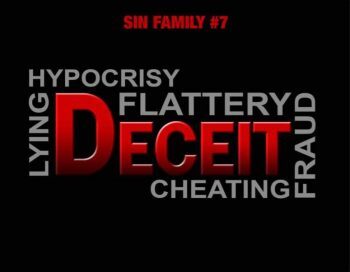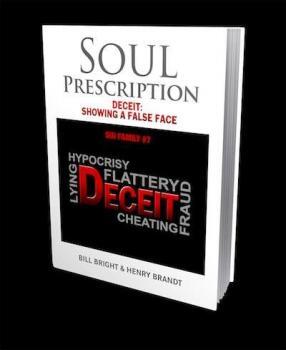Feeling guilty about that lie you told today? Or have you told so many that you have a hard time remembering what the truth is? Or perhaps you deceive subtly by pretending to be someone you’re not. Are your relationships suffering for it?
 Everyone is guilty of deceit to some extent. After all, we are told, “the human heart is the most deceitful of all things, and desperately wicked” (Jeremiah 17:9).
Everyone is guilty of deceit to some extent. After all, we are told, “the human heart is the most deceitful of all things, and desperately wicked” (Jeremiah 17:9).
Our race has participated in deception since Adam and Eve went along with the serpent’s lies about the fruit God had placed off-limits.
But some of us have a more serious problem in this area of deception. Some of us are serial deceivers.
Does that describe you? If so, where is your biggest problem with deception? Do you tell falsehoods when it serves your purpose? Do you pretend to be what you are not? Do you tell people what they want to hear about themselves, even when it is not true? Do you cheat to gain an advantage in a contest? Do you trick others for profit?
Lying is a form of deception that consistently earns God’s condemnation, for untruth interferes with justice and integrity in human relations.
Keep your tongue from speaking evil and your lips from telling lies!
—Psalm 34:13
I will not allow deceivers to serve in my house, and liars will not stay in my presence.
—Psalm 101:7
When we lie, we are not motivated by God but rather by His enemy. The Devil is the sponsor of untruth. Jesus testified that Satan “has always hated the truth, because there is no truth in him. When he lies, it is consistent with his character; for he is a liar and the father of lies” (John 8:44).
The truth wants to be free. It has a way of escaping into daylight despite every attempt to keep it trapped under a lid—ask any politician who has tried to prevent a scandal from reaching public notice. Benjamin Franklin said, “A lie stands on one leg, truth on two.” In the plain words of Scripture, “Truthful words stand the test of time, but lies are soon exposed” (Proverbs 12:19). Just as God knows every time we counterfeit the truth, so other people usually find out as well.
The practice of lying can easily develop into a habit over time. But truth telling can become a habit too. If your character has suffered from truth decay, resolve with Job, “As long as I live,… my tongue will speak no lies” (Job 27:3–4).
We know how tempting it can be to shade the truth or present oneself in a false light for selfish reasons. Nevertheless, each of us must give up deception and learn the ways of honesty and integrity.
We deceive because we are worried about what will happen to us if we choose to tell the truth. What we find, though, is that when we practice deceit, we disappoint God, chip away at our own self-respect, and run the risk of a worse reaction from others when they find out the truth later. The proper response is to trust God to care for us as we honor His command to be truth tellers. There is, in fact, no peace to be had without truth.
A. W. Tozer said, “A guileless mind is a great treasure; it is worth any price.” Are you willing to pay the price? It means forgoing the easy payoffs that deceit can seem to bring, choosing instead the slow and steady dividends of making your word your bond.
Give up the too-easy and too-costly habit of deceit. Embrace instead the policy of honesty at all times.
5 Steps to Overcome Deceit
 Discover how to overcome deceit in its various forms through time-tested insights that really work!
Discover how to overcome deceit in its various forms through time-tested insights that really work!
We have outlined a five-step process in the free e-book, DECEIT: Showing a False Face, to help you work through the repair of that area of your life.
[Download DECEIT: Showing a False Face for free now!]

